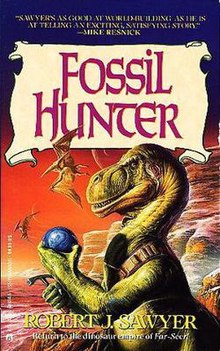Fossil hunter

First edition
The character depicted is Kee-Toroca, the main protagonist. He is the son of Sal-Afsan, the main character from the previous book. |
|
| Author | Robert J. Sawyer |
|---|---|
| Cover artist | Bob Eggleton |
| Country | Canada |
| Language | English |
| Series | Quintaglio Ascension Trilogy |
| Genre | Science fiction |
| Publisher | Ace Books |
|
Publication date
|
May 1993 |
| Media type | Print (hardback & paperback) |
| Pages | 290 pp |
| ISBN | |
| Preceded by | Far-Seer |
| Followed by | Foreigner |
Fossil Hunter is a novel written by Canadian science fiction author Robert J. Sawyer. The sequel to Far-Seer, it is the second book of the Quintaglio Ascension Trilogy. The book depicts an Earth-like world on a moon which orbits a gas giant, inhabited by a species of highly evolved, sentient Tyrannosaurs called Quintaglios, among various other creatures from the late cretaceous period, imported to this moon by aliens 65 million years prior to the story. Originally published in 1993 by Ace Science Fiction, it won the Homer award for "Best Novel" during its initial release date. It was reissued in 2005 by Tor Books.
The story takes place roughly sixteen years after the events of Far-Seer. In lieu of Afsan's discovery of the Quintaglio's real place in the universe, the Larskian faith has been abolished and worship of the Original Five hunters reinstated. Dybo is now the Emperor, with Afsan as his court astrologer, and Novato has been put in charge of the Quintaglio Exodus; a project meant to help the Quintaglios escape from their doomed world before it breaks apart. Toroca, son of Afsan and Novato, is now head of the Geological Survey of Land, meant to take a global inventory of the resources available for the Exodus project.
While undertaking the Geological Survey, Toroca finds a mysterious blue artifact, made of a seemingly indestructible material even harder than diamond. It appears to be mechanical, with moving parts, but having been found in some of the oldest rocks, is too old to have been manufactured by Quintaglios. He also begins to take notice of clues which cast into doubt his belief in the origin of the world as set forth in the book of Lubal. The world appears to be much older than five thousand kilodays, due to the rate of erosion being too slow, and during an expedition to the South Pole, he finds that it is inhabited entirely by many unique types of Wingfingers. Toroca hypothesises that they evolved from a common wingfinger ancestor.
...
Wikipedia
